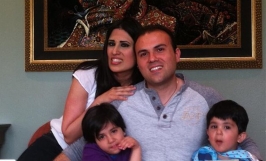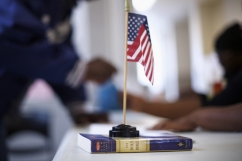If you're interested religion and politics in America, there's a good chance that you've read reports, studies, and commentaries about Republican presidential candidate Donald Trump's courting of evangelical Christians. Trump even hosted a closed door event where he worked hard to persuade more than 900 evangelicals that he is worthy of their support.
While many high profile evangelical pastors and political leaders have embraced Trump, with James Dobson even declaring that Trump has recently converted to Christianity, this awkward embrace of Trump and the evangelical leaders who had once opposed him isn't the whole story. Underneath the narratives about evangelicals taking Trump's side is a far more complex picture that undermines some of the charges of evangelical hypocrisy.
Comparing Trump to Bush
While Trump appears to have the support of 62 per cent of evangelicals according to current polls, Mitt Romney and George W Bush both enjoyed the support of more than eight in 10 evangelical voters. In other words, there's roughly a 20 per cent drop in evangelical support for Trump compared to previous Republican candidates.
While we can assume that roughly 10-20 per cent of evangelical voters are already progressives who will vote for Democrats or independents, this drop in past evangelical support shouldn't be overlooked. Do we know who the 20 per cent of evangelical voters are who have opted to not support Trump? Can we expect their numbers to increase as they learn more about Trump in the run up to the election?
Evangelicals were split in the primaries
While it's true that evangelicals and Christians in general voted for Trump in the primaries, it's also critical to remember that there were two strong evangelical candidates running against him who remained in the race: Marco Rubio and Ted Cruz. John Kasich also had strong Christian credentials. Since the several Republican primaries used variations of a winner-take-all format that awarded all delegates to the state's winner, Trump amassed victories in the midst of a divided evangelical vote.
Trump never won a clear majority of evangelical voters, even in the religious south. Evangelical voters were always spread out over the other candidates. Some have even argued that evangelicals helped slow Trump's advance in primary states such as Ohio.
It's the economy!
Moral issues drive only a small minority of evangelical voters, and so it's far more likely that Trump's tough talk on immigration and focus on economic issues motivated his supporters regardless of religion. In fact, the bigger story of this election is how populist movements have attempted to subvert the two-party system that has largely become beholden to corporations and wealthy donors.
Several journalists have suggested that Trump's success in the religious south is more likely a product of correlation than causation. Trump's focus on serving blue collar conservative voters and fighting for their interests has resonated with voters regardless of religion.
As more evangelicals acknowledge defeat in the culture war against same sex marriage and take abortion battles to the state level, Trump has filled a void among conservatives who have largely neglected the working class. In fact, the evangelical support that Trump enjoys may largely be a matter of some evangelicals struggling to choose between two troubling candidates and deciding Trump is the lesser of two evils since Hillary has long been taboo for conservatives.
National evangelicals v local pastors
If you asked the average American evangelical who Max Lucado is vs Robert Jeffress, it's likely that the majority will know who Lucado is, while Jeffress is more well known in his own Dallas, Texas area. Jeffress is one of Trump's evangelical advisers, while Max Lucado is a beloved, bestselling author who has written a scathing critique of Trump.
In addition, while Trump supporter Franklin Graham occupies the Graham family legacy and boasts a large social media following, it's no small thing that Albert Mohler of the Southern Baptist Convention has used his significant clout to call out Donald Trump. While Trump can boast that some big names in the realm of evangelical politics have taken his side, several of the household names in American evangelicalism oppose him. In other words, Lucado is far more representative of American evangelicalism than pastor Robert Jeffress or a politician like Michele Bachmann.
Church attendance correlates with opposing Trump
One of the most important ways that sociologists of religion distinguish between evangelicals who practise their faith and cultural evangelicals who are less active with their faith is church attendance. Of course this isn't a perfect measurement, but it helps us get a better handle on major evangelical trends, and it's particularly revealing when it comes to Trump.
Among evangelicals, only 35 per cent who attend church weekly support Trump, while 55 per cent of those who seldom attend church voiced support for Trump. While it's fair to say that even 35 per cent of church-attending evangelicals is too high a number to support a man whose life appears opposed to biblical morality, the Bible's commands about welcoming strangers and the teaching of Jesus to love our neighbours and even our enemies, it's at least reassuring to know that the evangelical movement has hardly migrated to Trump en masse.
I personally stand among the ranks of evangelicals who are deeply disturbed by the rise of Donald Trump, and I could name hundreds of evangelical scholars, pastors, and authors who also feel this way. Many evangelicals lament the fact that so many Christian leaders have supported him. There's no silver lining to this story in that sense. Rather, we have a complex picture of the evangelical movement that is fractured, divided, and hardly speaking with one voice about the candidacy of Donald Trump.
Ed Cyzewski (MDiv) is the author of Coffeehouse Theology, A Christian Survival Guide, and The Contemplative Writer. He writes at www.edcyzewski.com and is on Twitter as @edcyzewski.


















